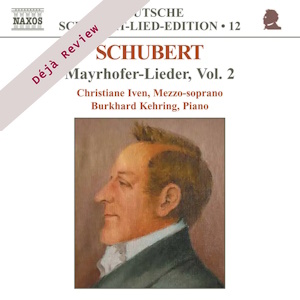
Déjà Review: this review was first published in June 2003 and the recording is still available.
Franz Schubert (1797-1828)
Mayrhofer Lieder Volume 2
Christiane Iven (mezzo)
Burhard Kehring (piano)
rec. 2002, Studio 2, Bavarian Radio, Munich
Deutsche Schubert-Lied-Edition 12
Naxos 8.554739 [60]
What a truly amazing composer Schubert was! He set the words of over 115 poets to music and these writers covered most of recorded history from Classical Greece, the Middle-Ages and the Renaissance to 18th Century German authors, early Romantics and Heine. The Naxos Deutsche Schubert-Lied-Edition encompasses over 700 songs grouped together according to the poets who inspired him, and even include his textual alterations showing just how much he was influenced by the importance of the spoken word.
After Goethe and Schiller Schubert set no less than 47 poems by the comparatively little known Mayrhofer, as well as three other of his works. The first of these songs that figure on this disc, “Am See”, he wrote in 1814 when he was barely 17 years old. Introduced to Mayrhofer by their mutual friend Joseph von Spaun, Schubert eventually left his parents’ home to take a room at the poet’s house where he remained for 2 years.
This disc, volume 2, presents 15 of Schubert’s Mayrhofer songs, all of them short except for “Uraniens Flucht”, D554, which is over 18 minutes long, comprising no less than 27 verses and which remained unpublished until 1895.
Both the songs and the performers were new to me but what discoveries they proved to be! The songs are pure delight not that that is any surprise coming from the pen of such a towering master of writing for the human voice. Quite simply they are sparkling jewels of delicious simplicity, beautifully constructed, perfectly balanced and are exquisitely performed. I can rarely recall a disc of songs I’ve enjoyed more. Christiane Iven’s voice is ice-clear. She is a gem of a singer with a pitch and timbre that belies the fact that she’s a mezzo-soprano as her voice has none of the thicker resonances associated with such a range. I wasn’t surprised, therefore to note that she made her operatic debut in soprano roles in Hanover singing the Countess in Le nozze di Figaro. Her wonderfully articulated phrasing and superb intonation makes the whole disc a really thrilling experience and in Burkhard Kehring she has an accompanist who has just the right sense of presence that is powerful when required and subdued when necessary but always of subtle support to his soloist.
The disc gets off to a wonderful start with “Am See” which deals with the death of Duke Leopold of Brunswick in an attempt to save people during a flood in Brunswick in 1785, two years before Mayrhofer’s birth in 1787. As with several others on this record this song was not published until decades after Schubert’s death. With others that may have been due to what was considered sensitive material, as the Austrian State, like so many others around that time, was always on the lookout for “subversive” utterances on the part of its citizens. Mayrhofer often used classical Greek settings in which to express his ideas of freedom in much the same way as writers in the 20th century used science-fiction as a vehicle in which to criticise their own states. This fact makes it all the more interesting to note that indeed Mayrhofer himself worked as censor at the Imperial and Royal Book Censorship Office. Nevertheless he was a champion of liberal ideas and, for example, was greatly heartened by the uprising in Poland in 1830 but so depressed by its failure that he tried to drown himself in the Danube. Six years later this sensitivity, coupled with hypochondria, led Mayrhofer to throw himself to his death from his office building in a deluded fear of cholera then raging in Vienna.
It is difficult to choose my favourites on this record and it’s a general feeling I have with Schubert’s songs, as they are all so perfect in conception and brilliant in their execution. When you have a singer so obviously talented and in sympathy with the material such as Christiane Iven it makes highlighting individual items even more difficult but after “Am See” I really loved “Liane” which has a most delightfully amusing accompaniment, “Schlaflied”, in which, interestingly, Schubert altered 8 out of 12 lines to fit the music more perfectly but without any loss of sense, and “Uraniens Flucht”, a real main course dish that rewards many hearings.
Whilst listening to this disc in my lounge it struck me very forcefully that repertoire such as this is perfect for the medium of today’s advanced recording techniques – surely this is what the CD was invented for! I felt more strongly than usual that the performers were there in person, just for me, as this disc is so wonderfully recorded. In short it is intimacy in music encapsulated on a small circle of plastic – remarkable and breathtaking!
Steve Arloff
Previous review by Christopher Howell (April 2003 – Déjà Review April 2024)
Buying this recording via a link below generates revenue for MWI, which helps the site remain free


Contents
Am See (second version), D124 (1814)
Augenlied, D297 (1817?)
Liane, D298 (1815)
Abendlied der Furstin, D495 (1816)
Sehnsucht, D516 (1816?)
Schlaflied (Schlummerlied) (First version), D527 (1817)
Am Strome, D539 (1817)
Uraniens Flucht, D554 (1817)
Iphigenia (Second Version), D573 (1817)
Atys, D585 (1817)
Erlafsee, D586 (1817)
Biem Winde, D669 (1819)
Die Sternennachte, D670 (1819)
Abendstern, D806 (1824)
Auflosung, D807 (1824)

















